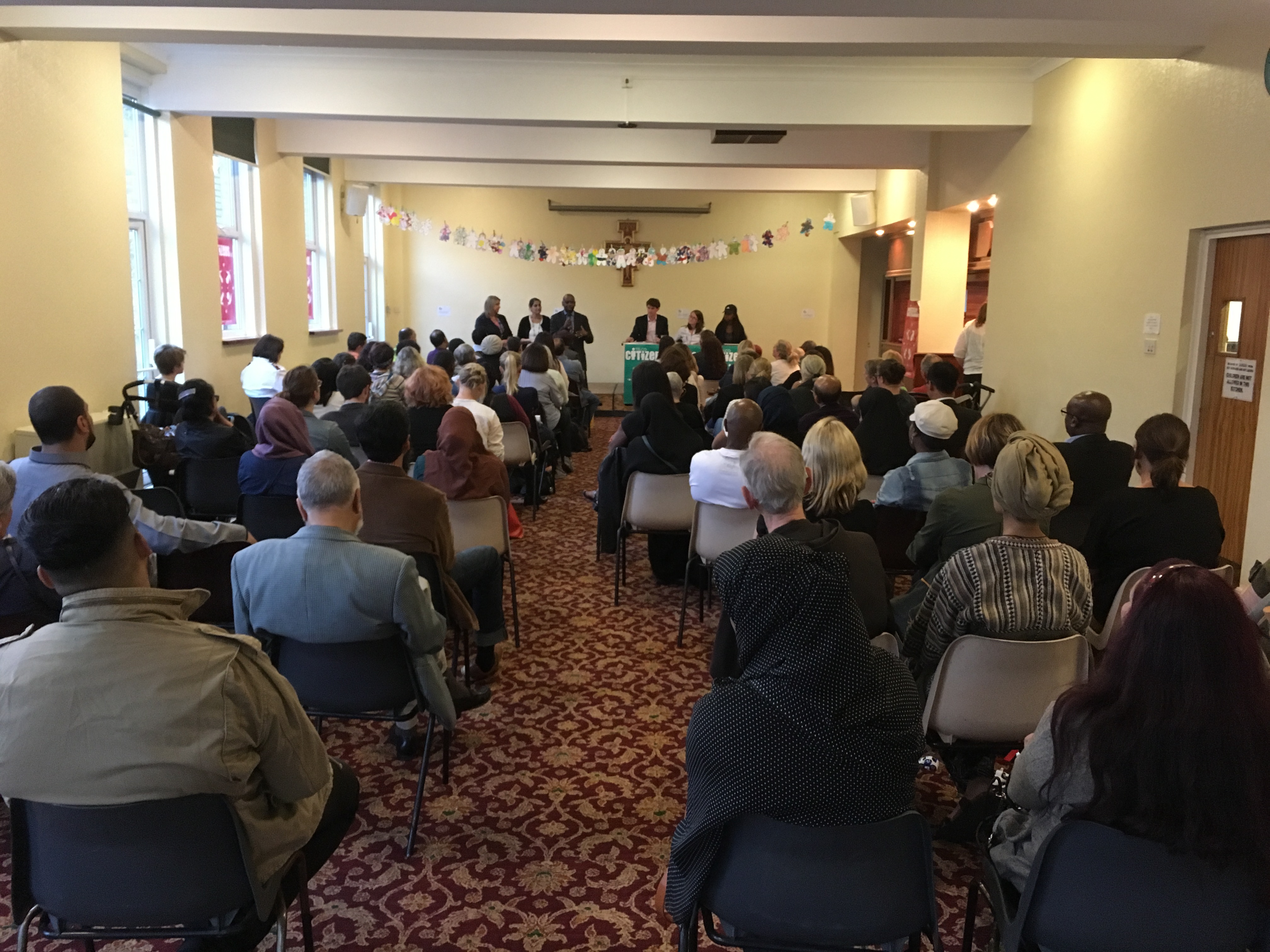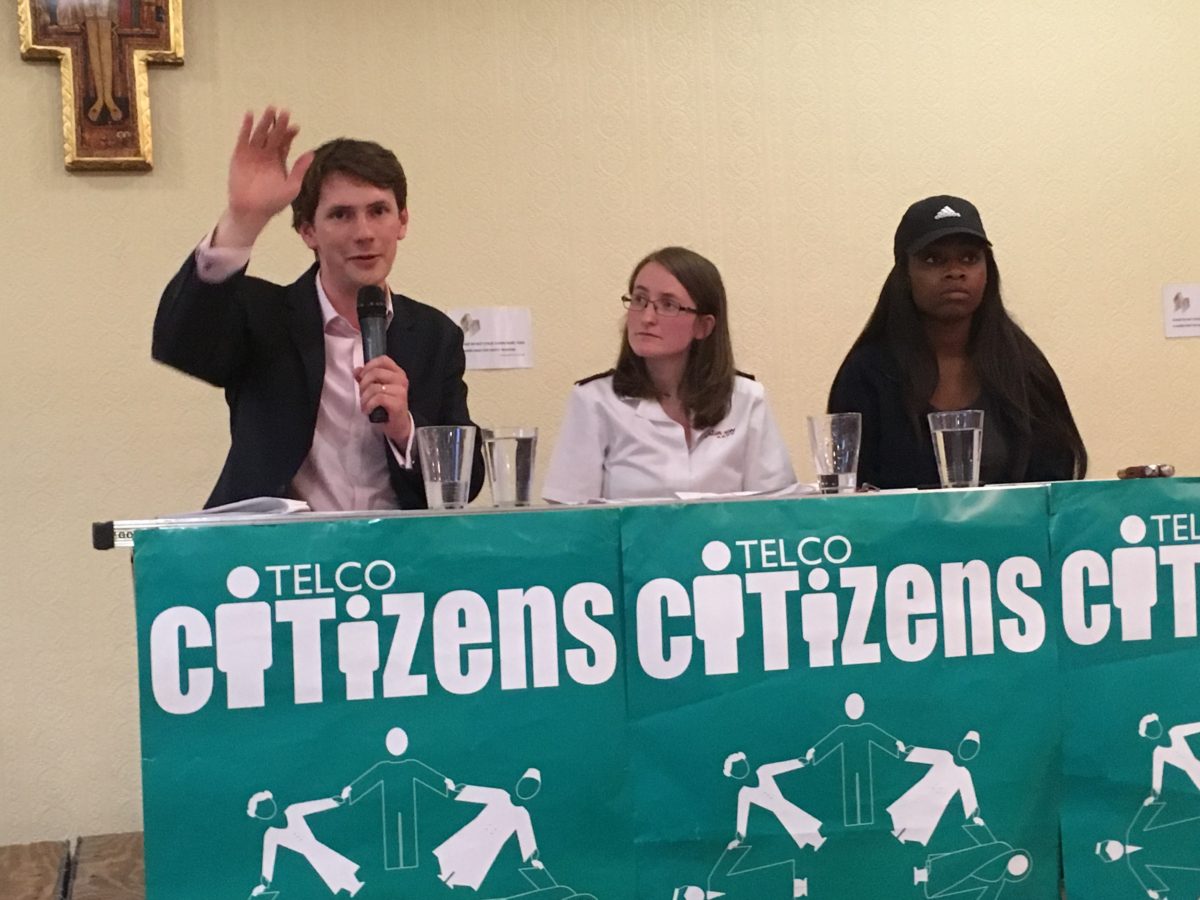Following the passage of the Dubs Amendment, the Home Office is consulting with local authorities to determine how many unaccompanied children the UK will be able to accept. Since each council’s pledge will be determined by its fostering capacity our local Refugee Welcome Team has been working to promote fostering in Redbridge.
We’ve held an evening to promote fostering to those within our faith communities and to ask the Leader of the Council, Jas Athwal, to pledge to accept five Syrian refugee children. The evening featured presentations from CORAM, Home for Good and Redbridge Council about fostering, as well as testimony from Ernest, who came to the UK as an unaccompanied Albanian refugee, and Farduous, who came here as a Syrian refugee.

Following the action, we took time to evaluate. This was an opportunity to celebrate people who had done well, congratulate individuals who had developed their skills and recognise leaders who had brought others to participate in public life. It was also an invaluable chance to learn specific lessons about community organising. How did you feel? What had gone well? What could we have done better? What had changed as a result of the evening?
My instinctive response to the final question surprised me. It wasn’t the answer I or anyone else was expecting. Because the answer was me. I had changed.
Before the fostering event, I and another member of the team went to meet representatives from the council for a pre-negotiation. I came away thinking that we were asking for the impossible. And so before our event I was a nervous wreck – what was I going to do if the Leader of the Council tried to deflect the question or, even worse, refused outright. I wondered, should we ask for something smaller – maybe ask for less children, maybe not even ask him to commit to act at all. But with the encouragement of others on the team, I found the courage to live with the tension and ask anyway.
Justice seeking demanded that I broke free from my concern about looking foolish. It required that I was prepared to fail if the Leader didn’t give us what we wanted. I needed to ignore my natural inclination to play it safe and disturb the present to better the future.
Of course, this wasn’t all that had changed. Together we had secured a commitment from the Leader of the Council to accept unaccompanied refugee children under the Dubs amendment, although we were disappointed he would not commit to a specific number in contrast to the Leader of the Council in Hammersmith & Fulham, Stephen Cowan, who committed to his borough resettling at least 10 unaccompanied children. Furthermore, we had recruited sixteen potential foster carers. But nonetheless, the change in me is important because it makes me a little bit more who God would have me be.
When the prophet Micah questions what the Lord requires of his people, he responds ‘ To act justly and to love mercy and to walk humbly with your God.’ (6:8)
God’s intention is that our justice seeking, our acts of compassion and our rhythms of discipleship are integrated and interconnected; each a vital and connected part of our spiritual formation.
Justice seeking inevitably arises from a frustration with acts of compassion that serve the suffering but don’t address the causes of the misery, However, justice seeking should also shape our acts of compassion so we serve in ways that empower and bestow dignity rather than foster dependence. Similarly, while justice seeking is an important expression of our discipleship, it is also a place where we are spiritually formed as God challenges us to change, highlighting the places where our character isn’t consistent with the person of Jesus and giving opportunity for the fruit of the Spirit to grow within us.
However, Adele Calhoun reminds us ‘experiences don’t necessarily bring wisdom, nor do they automatically transform us. We need to listen and reflect on our experiences in the presence of the Holy Spirit to learn from them’ (Spiritual Disciplines Handbook 2005: 57). It’s important that we take time to pay attention to how our justice seeking is shaping who we are, allowing it to transform us into the image of Christ.
Some prompts for reflection:
- What do you personally find most challenging about justice seeking? Ask God to show you how this might be connected to aspects of your personality where He is leading you to change to become more like Jesus.
- Look back over your diary for the last month – how much time have you invested in justice seeking, in acts of compassion and in rhythms of discipleship? Is there a particular area you’re not investing in enough?
- Next time you engage in an act of justice-seeking, ask yourself ‘what’s changed?’ and write about this in your journal
Opportunities for Action:
Since January, when a small group of children were reunited with their families at St Pancras Station, another 178 children have been identified, living in terrible conditions in Calais, who have a right to be reunited with their families here in the UK. Disappointingly, the government has transferred less than 50. Worse still there are 14 waiting for up to 10 weeks, whose travel has been fully approved. It’s not good enough.
In addition to this, The Welcome Summit on Saturday 10th September is a gathering for the groups behind the Refugees Welcome movement from right across the country.
It’s a moment, one year on from the tragic death of Aylan Kurdi, to come together and celebrate what we’ve achieved, take stock of the British response to date, and to plan, train and act together to build a more welcoming Britain. We will also use the time to build accountable relationships with key actors, from government ministers to UN agencies, around key issues including the protection of refugee children, development of community sponsorship, and building of strong communities.
You can read more about the details of the day here, and register your attendance here.

